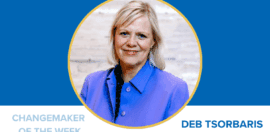Harnessing the creative power of art to inspire Climate Action
Deborah Hart is the Chair and Co-Founder of CLIMARTE, she is this weeks Pro Bono Australia change maker!

Print
Harnessing the creative power of art to inspire Climate Action
21 June 2024 at 9:00 am
21 June 2024 at 9:00 am
Deborah Hart is a climate and environment focussed creative producer and writer based in Narrm (Melbourne). After 16 years working in development roles with leading Australian arts and culture organisations—as increasingly neoliberal government policies were forcing important public organisations to form ever-closer alliances with harmful industries—Deborah left her profession in order to devote more time to climate activism.
Deborah founded LIVE (Locals Into Victoria’s Environment, 2006) and later co-founded CLIMARTE (2010) and ClimActs (2013) to harness the power of creative arts and ‘performative’ action to highlight the causes and urgency of the Climate Emergency as well as the readily available and socially and ecologically sustainable solutions.
Describe your career trajectory and how you got to your current position.
As a child growing up in the 1970s I was fascinated by the natural world and strongly identified with the intersecting environment and social justice movements building to protect people and nature. My other great inspiration was art, for all of the imaginative and visionary ideas it generates. I have early memories of worrying about how to answer questions about what I “wanted to be” when I grew up because really I just wanted the way the world was working to change, and found common statements like “but that’s just the way it is” profoundly ridiculous.
So, I was fortunate to achieve an honours Arts degree with majors in politics and economics from Monash University. While doing this I worked in hospitality, as well as in a small commercial gallery, all of which provided excellent opportunities to learn a lot about people! Through meeting the head of a major PR company, I was offered an administrative job that I wasn’t really interested in (and really didn’t feel suitably qualified for) but in politely declining was suggested for a support role in development at the Melbourne Theatre Company. So, my first full time job was working for an Arts organisation whose work I still absolutely love – negotiating sponsorships, designing fundraising campaigns and organising special events.
From 1990 until 2006, I had the privilege of working with numerous leading arts and culture organisations. Meanwhile, since my father worked in the energy industry, I had grown up aware of the grave threats posed by extracting and burning fossil fuels and was really concerned that global warming was being ignored. Having also become a parent I felt deeply responsible for the state of the world being left to their generation and those to follow. As much as I loved my job working with artists and creative producers, I was increasingly aware that cuts to critical funding was forcing the Arts (like other important public institutions/crucibles in democracy) to form alliances with the very industries that they exist to critique. In effect, proud public institutions were becoming cheap marketing arms for harmful industries. I felt it was time to use everything I had learned to challenge the ‘business as usual’ culture that is at the heart of the Climate Emergency.
Take us through a typical day of work for you.
My days typically start with responding to emails and scanning the news for fossil fuel industry funded disinformation and associated ‘culture war’ distractions. Given that the science explaining the threats to Everything from fossil fuel use was well understood in the late 1960s—and that zero emission alternatives for energy (as well as packaging) were well in development in the early 1970s— it’s beyond appalling that polluters and their political and financial allies are doubling down on known lies to prevent the urgently needed clean energy transition.
Often there will be online meetings with artists and/or creative producers and/or with allied organisations with whom we are collaborating on projects intersecting climate, culture and community in ways that envision a socially and ecologically sustainable future that works for people and the natural world all life relies on.
I also do a lot of writing for CLIMARTE communications, researching and writing grant applications and preparing acquittal reports.
What is the biggest challenge you’ve encountered in your career, and how did you overcome it?
On the eve of publication, out of fear that it was ‘political’ my book Guarding Eden: Champions of Climate Action was dropped from use as a cross-curriculum resource across numerous grades and subjects by a leading national sustainability educator. Having worked so hard to provide a simply written book intersecting personal stories with best available, verifiable climate science and campaign history information to assist young people to advocate for a better future, this really was a devastating blow for all involved.
Guarding Eden’s launch was carefully timed for World Environment Day 2015, five months prior to the COP21 that led to the Paris Agreement. The Abbott Government—which had deep ties to the fossil fuel industry that sensed that its ‘business as usual’ (maximise private profits at all costs) culture was threatened—was then racing to dismantle as much of the former Gillard Government’s world-leading climate and environment protection laws as it possibly could. In addition to this, the then new Coalition Government was seeking to remove charitable status from environment focussed NGOs that they considered to be engaging in ‘political’ advocacy.
Following a targeted attack on the sustainability educator by the industry publication Quadrant, Guarding Eden’s curriculum programs were simply shredded because the organisation feared losing its charity status. This was despite Guarding Eden’s publisher Allen & Unwin having arranged a rigorous fact-checking process by Dr Joëlle Gergis (who subsequently became a lead IPCC author as well as the author of Sunburnt Country and Humanity’s Moment), under the direction of one of Australia’s most celebrated atmospheric scientists as well as lead IPCC author Prof David Karoly, who officially launched it. Seriously, who made access to a liveable planet ‘political’? And this set back just made me more determined to fight harder for climate justice.
If you could go back in time, what piece of advice would you give yourself as you first embarked on your career?
Always be curious, pay attention and approach everything through a justice-based, complex systems lens. Approach challenges creatively. Listen carefully and act intuitively and collaboratively. Remain focussed. Demonstrate patience, resilience, and care under pressure. Do your best, understanding that dismantling unjust, entrenched socio-economic systems is a long game.
How do you unwind after work?
I love to check in with the natural world around me. And to consciously look up at the sky, feel its expanse. As I live in inner Melbourne, I’m lucky that some beautiful parks are nearby.







